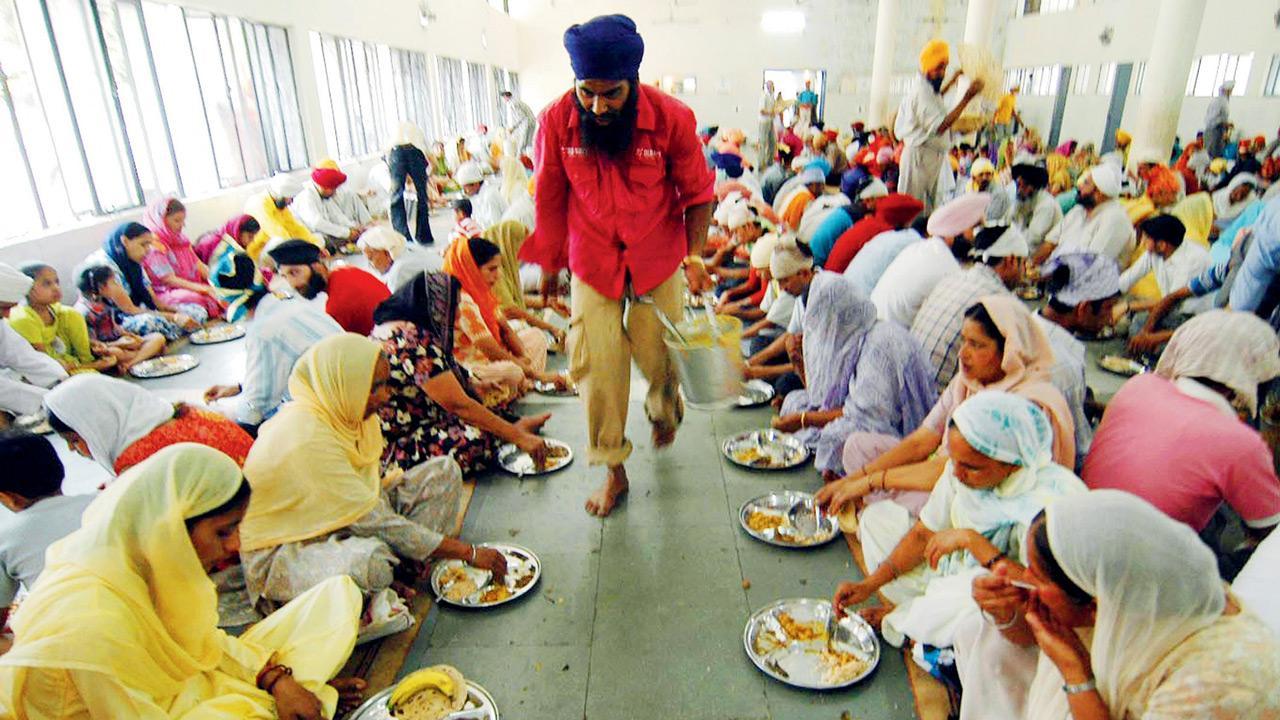A new self-help guide described as our answer to Japan’s Ikigai draws from the value of seva to help you find happiness

A Sikh devotee distributes langar at the Gurudwara Santokh Sar Sikh Temple in Amritsar on the occasion of the 444th birth anniversary of Sikhism’s fifth guru, Guru Arjun Dev. Pic/Getty Images
In June last year, when the pandemic was raging in the US, a group of 30 cooks at the Sikh Centre of New York in Queens Village, had busied themselves in the kitchen, starting their day at 4 am, preparing hot Indian meals for hospital workers. In the short span of 10 weeks, they had served about 1,45,000 free meals, enough to get the attention of The New York Times that published an article titled, How to Feed Crowds in a Protest or Pandemic? The Sikhs Know.
ADVERTISEMENT
They were doing seva, an act of selfless service and giving, which is at the heart of Sikhism, says writer-journalist Jasreen Mayal Khanna. Her new book, Seva: Sikh Secrets on How to be Good in the Real World (Juggernaut), unlocks the science behind the eight rules for daily life—ascribed to seva—to become kinder and happier, and lead a more meaningful life.
The first time Khanna remembers doing seva was as an eight-year-old at the Dhan Pothohar, her local gurudwara in Mumbai. With a basket of rotis, she remembers walking into the langar hall, feeling rather “shy and small”. “I felt a glow akin to the psychological concept of flow,” she shares now, in an email interview. “It’s never explicitly said, but I always had the sense that I was doing seva to play my part in the community. The focus was never on doing a good or selfless deed for someone else. We would all chop or cook in a steady meditative rhythm and then go back to our normal lives—feeling a little more relaxed after seva. The funny thing is that even the sevadars had seva done for them—usually a snack langar like tea and samosas. Such are the Sikhs!”
Jasreen Mayal Khanna
Her book, which has been described as “India’s answer to Japan’s Ikigai”, is peppered with wisdom, drawing from the teachings and philosophies of Guru Nanak and the 10 gurus. Before starting work on the book, Khanna did an online course on Sikhism offered by Harvard University, because “I wanted to make sure my understanding of the religion’s history and scripture is accurate”. “As part of my research, I [also] dug up studies from the behavioural sciences to substantiate my thesis, because I wanted seva to appeal to everyone, irrespective of whether they believe in religion or not. The science behind seva was a game changer for me; giving is associated with lower BP, lower mortality rates and higher markers of happiness,” she says. She also spoke with prominent names within the community, including Nimrat Kaur, Tavleen Singh, Ranveer Brar and Lt General IS Singha. “These conversations were truly enlightening because I got to hear of the various ways that individuals incorporate Sikhi in modern life,” she shares.
Writing the book while the world was battling a dreaded contagion also helped her understand how to incorporate seva into her own life. As a first-time mum, this was also a personally challenging time. “I had breastfeeding struggles and mom-guilt, I was moody and not in control of my emotions. My son had to go through surgery when he was six weeks old and simultaneously a close family member tested positive for COVID. It was a tough phase and one day when I was having a meltdown, I found myself going into the kitchen and cooking a giant pot of my grandmother’s biryani. I sent tiffins of it to two friends who were living away from their families during lockdown. Did this fix all my problems? No. But it did give me some joy for that day and dissipated my anxiety to some extent,” she remembers.
One of the rules of seva, which she found hard to practise was building resilience. “But, considering we are living in a pandemic, it has also been my greatest learning. When you feel broken yourself, it can be very hard to swim instead of sinking and I found that the Sikh practice of shukrana [gratitude] went a long way in helping me overcome adversity,” she shares. The Sikh concept of chardi kala, which translates to eternal positivity, is much-needed for our times, she feels. “No, in the real world it’s not possible to feel eternal positivity. What is worthwhile, however, is the attempt. Sikhs say ‘chard i kala’ during celebrations and weddings, at funerals and to each other when life deals them a blow.”
A few rules for a happy life
1 Help someone every day
2 Embrace joy
3 Be brave
4 Say thank you daily
5 Learn to laugh at yourself
WHAT: Seva: Sikh Secrets on How to be Good in the Real World
WHERE: amazon.in
FOR: Rs 351
 Subscribe today by clicking the link and stay updated with the latest news!" Click here!
Subscribe today by clicking the link and stay updated with the latest news!" Click here!






